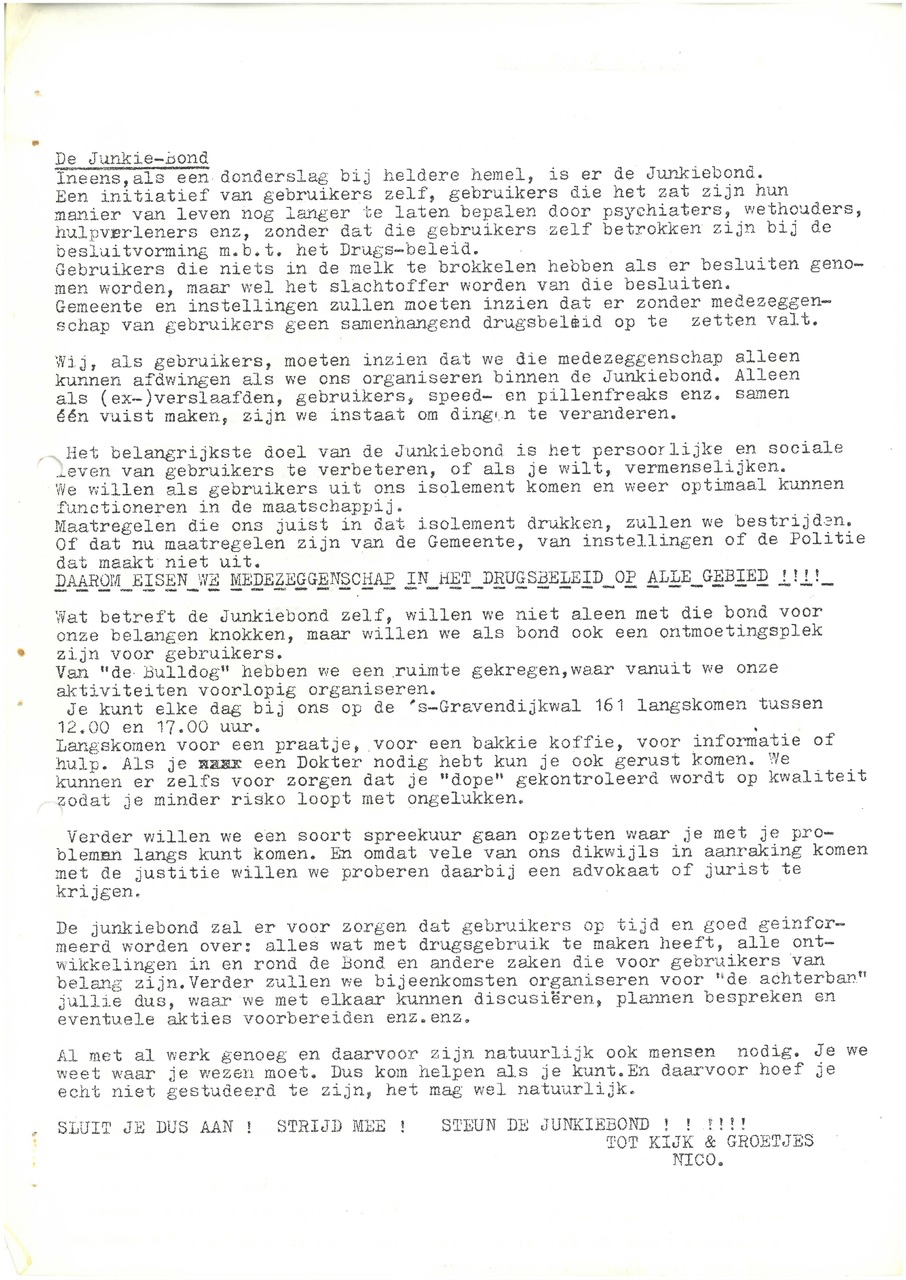The Rotterdam Junkie Union
The Rotterdam Junkie Union was the first user-created interest group for drug users. It was formed in 1980. In the 1980s the union organized multiple protests, provided harm reduction measures, and spoke out against forced treatment for drug users. The union received subsidy from the city of Rotterdam and had close ties to Rotterdam St. Paul’s Church.
By the end of the 1970s treatment for Dutch drug users mostly centered around abstinence. In 1980, the mayors of the four major Dutch cities discussed forcing drug addicts into treatment through the Insanity Act. This was a direct reason for a group of users to organize in the Rotterdam Junkie Union. One of its most famous founders was Nico Adriaans, who served as the union’s chairman until 1986. They announced their creation on the first page of their magazine Dope:
Suddenly, like a bolt from the blue, there is the Junkie Union. An initiative from users themselves, users who are fed up with having their life decided by psychiatrists, lawmakers, aid providers etc. without these users being involved with decision-making about drug policies themselves.

Dope Magazine 1
UnknownThe union argued for the acceptance of drug users and drug use, rather than abstinence. From the onset its members fought for the free distribution of methadone, better treatment of users by the police, and the prevention of forced treatment. The formation of the Rotterdam Junkie Union was part of a larger historical movement in the late 1970s and 1980s. Across the Netherlands multiple user-oriented organizations came into existence, for example, the Amsterdam MDHG. Moreover, 15 to 20 Junkie Unions followed Rotterdam’s example and eventually organized under the umbrella of the Federation of Junkie Unions.
From the start the Rotterdam Junkie Union actively sought support from local governing bodies . They were successful in acquiring subsidy from the city of Rotterdam. The union also actively reached out Rotterdam users. They welcomed users to their office for a cup of coffee and spread pamphlets among the community. Moreover, in their magazine Dope, they kept users informed about their efforts and published stories from the user scene. They kept close ties to St. Paul's Church and its reverend Hans Visser. Adriaans and Visser became friends and created multiple locations where drug users could come for aid and shelter. Together the two were also key in the development of Platform Zero.
In the 1980s the union drew attention by occupying buildings and providing harm reduction measures. Between 1981 and 1985 the union occupied the offices of local and national alcohol and drug consultation centers and the office of the Rotterdam drug coordinator. They also advocated and provided harm reduction measures. For example, they petitioned pharmacists to sell needles, and provided needles and free condoms at their office. The union also spoke out frequently for an open methadone distribution. The culmination of these efforts was the creation of an emergency methadone distribution program between 1981 and 1982. Together with a sympathizing pharmacist and doctor the union provided methadone to Rotterdam drug users in need.
In 1986 Nico Adriaans left the junkie union. In the ‘90s Nora Storm took over as the chairwoman and the union continued its efforts to further the interest of drug users. After Adriaans’ death in 1996 the Nico Adriaans foundation was formed, which is still active in Rotterdam today.
Further reading:
- Blok, G., Dinges, M., Jütte, R., and History. “The Politics of Intoxication. Dutch Junkie Unions Fight against the Ideal of a Drug-Free Society, 1975-1990.” In Medizin, Gesellschaft Und Geschichte : Jahrbuch Des Instituts Für Geschichte Der Medizin Der Robert Bosch Stiftung. Beihefte, Vol. 39. Steiner, 2011. Available from: https://heroineepidemie.nl/wp-content/uploads/The-politics-of-intoxication.pdf
- Mold, Alex, and Virginia Berridge. “‘The Rise of the User’? Voluntary Organizations, the State and Illegal Drugs in England since the 1960s.” Drugs: Education, Prevention and Policy 15, no. 5 (January 1, 2008): 451–61. https://doi.org/10.1080/09687630801937330.
- Nico Adriaans Stichting. https://nasrotterdam.nl/